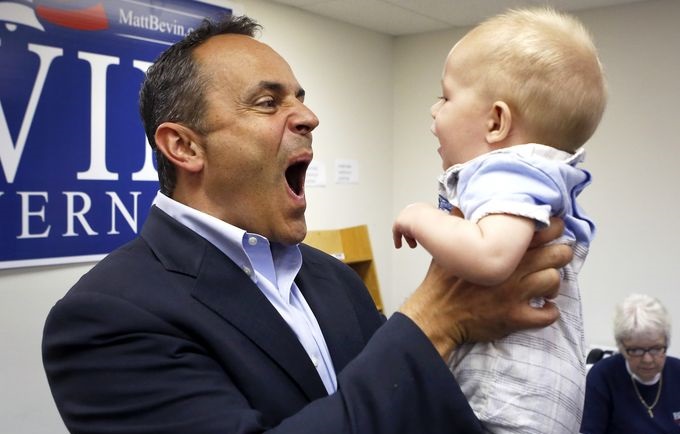The people of Kentucky face an important moment of decision on Election Day this year, and the issues at stake are, rightly understood, as urgent as life and death. The fault lines in the race for governor of the commonwealth are political, economic, personal and moral. This is not just a clash of personalities and parties, it is a clash of worldviews distilled into the choice Kentuckians will make when we go into the voting booth.
There was a time when much less was at stake in most elections, but that was long ago. If you take a look at the 1960 platforms adopted by the national Democratic and Republican parties, you will find many differences of tone and messaging, but not a great deal of difference on the basics of foreign policy and domestic issues. You will find virtually no reference to an issue like abortion.
Then came the cultural and moral tumult of the 1960s, the sexual revolution and the demand for legalized abortion. Even then, the advocates of legal abortion at the national level would never have been able to pass such legislation in Congress, so they turned to the increasingly progressive courts, which were all too ready to usurp the political process.
The 1973 Roe vs. Wade decision was the capstone of their efforts, but the backlash was beyond what abortion activists imagined. Justice Harry Blackmun, who wrote the majority opinion for the Supreme Court, expressed the hope that the decision would put the abortion issue to rest in the United States.
Thankfully, it did not. Instead, with every passing election cycle, the great divide over abortion grows only wider and deeper. Americans devoted to the sanctity of unborn life and Americans who demand what they insist should be called “a woman’s right to choose” abortion now face off in every national election. By 2016, the platforms of the Democratic and Republican parties were diametrically opposed on the question of abortion. But the political and moral divide now covers a range of pressing moral issues, including the defense of religious liberty in the inevitable collision with the revolution pivoting on the issues of sexuality and gender.
The 2016 platform of the Democratic Party called for virtually unrestricted abortion rights and even for taxpayer funding for abortion. The Republican Party platform called for the defense of the unborn and the right of states to adopt legislation restricting abortion on demand. There is every reason to believe that the 2020 platforms will reveal an even deeper divide, with all leading candidates for the 2020 Democratic presidential nomination calling even for the elimination of the Hyde Amendment, which was originally adopted with wide bipartisan support.
Keep up with the latest pro-life news and information on Twitter. Follow @LifeNewsHQ
Furthermore, the national Democratic Party demonstrates an increasing intention to use the power of the state to coerce alignment with the LGBTQ revolution. Just consider the recent statement by former congressman Beto O’Rourke that he would seek to remove the tax-exempt status of churches and religious institutions that cannot affirm same-sex marriage and the sexual and transgender revolutions. He doubled down on his statement, only to walk it back very slightly the next day, but only by removing churches from the threat — not religious schools, colleges and ministries.
On Nov. 5, Kentucky voters will vote for governor and a host of state officials. Every one of those choices is important, and every one is a test of the individual voter’s beliefs and convictions. Given what is at stake now, this election does not take place in a vacuum.
Put simply, the Republican candidate for governor, Gov. Matt Bevin, represents the worldview and commitments of the Republican Party at the national level. Likewise, Attorney General Andy Beshear represents the values and commitment of the national Democratic Party.
This is most clear concerning abortion. Over his four years in office, Bevin has been a stalwart defender of unborn life and the sanctity of human life. He has supported and signed into law a provision that would protect the unborn child once a fetal heartbeat is detected.
In response, Beshear announced that he would not defend the law in the federal courts, and he and his campaign have made clear his support for Roe v. Wade and abortion rights. He held a fundraiser hosted by an abortion provider and accepted the endorsement of NARAL, which advocates nationally for legal abortion on demand all the way to the moment of birth.
The bottom line is that there is no legislative measure limiting abortion that Bevin would not sign, and there is no limitation on abortion that Beshear would sign, period. The voters of Kentucky must understand what is at stake and defenders of unborn life must get out and vote their convictions on Nov. 5. The signal sent in Kentucky will be heard across the nation.
LifeNews Note: R. Albert Mohler Jr. is president of The Southern Baptist Theological Seminary.

Please click here to read the full story.
Author: Albert Mohler Jr




